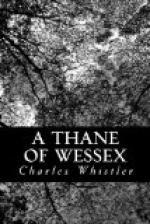Now I knew not what his wish to see me might mean, but from him I looked for no harm, remembering how he had seemed to favour me even in refusing my request. But, least of all did I look for him to come forward to meet me, taking both my hands, and grasping them, while he thanked me for the day’s work.
“Lightly I let you go last night, Heregar,” he said, “setting little store on the matter among all the trouble of the gathering. But when I sent you away and forgot you, surely the saints guided me. For I have heard how you dared to go down to Stert and warn us all, and I saw you stay the flight, even now. Much praise, and more than that, is due to you. Were you in the fight?”
Then I could answer him to a plain question; for all this praise, though it was good to hear, abashed me.
“Nay, Sheriff,” I answered. “Fain would I have been there, but a wiser head than mine advised me, and bade me do your bidding, and forbear. Else should I surely have fought.”
“Loyalty has brought good to us all, Heregar,” he said, looking squarely at me. “Yet should I have hardly blamed you had you disobeyed me.”
Then I flushed red, thinking shame not to have done so, and went to excuse myself for obedience.
“Yet had I the safety of a lady who must die, if the battle went wrongly for us, laid on me in a way,” I said.
“Matelgar’s fair daughter?” he asked.
“Aye, Sheriff,” And I told him of the flight from the hall, and where she was now, wondering how he guessed this. But I had come from Stert, and therefore the guess was no wonder. He looked at me gravely, and then sat down, motioning me to be seated also. He treated me not as an outlaw, I thought.
“Matelgar is dead,” he said. “I saw him fall, and tried to bring him off. He was not yet sped when we beat off the Danes. And he had time to speak to me.”
I bowed in silence, not knowing what to say. Strange that, now my enemy was dead, I had no joy in it; but I thought of Alswythe only.
The sheriff went on, looking at me closely.
“He bade me find Heregar, the outlawed thane who spoke last night to me, and bid him forgive. Then he died, and I must needs leave him, for the Danes came on in force.”
Still I was silent, for many thoughts came up in my heart and choked me. How I had hated him, and yet how he had wronged me—even to seeking my life. Yet was I beginning to think of him but as a bad father to my Alswythe, but a man to be held in some regard, for the sake of her love to him. And it seems to me that shaping my words to this end so often had gradually turned my utter bitterness away: for one has to make one’s thoughts go the way one speaks, if one would seem to speak true.
“I may not make out all this, Heregar, my friend,” said the sheriff; “but that you were disloyal ever, no man may say in my hearing after this day’s work. And I know that Matelgar was the foremost in accusing you. Wherefore it seems to me that there was work there to be forgiven by you. Is that so?”




